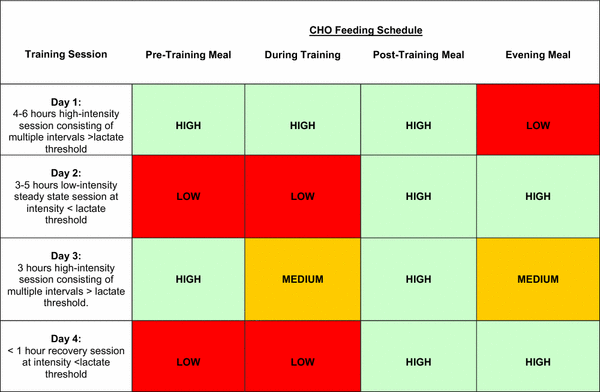Inside this article, I’ll discuss the benefits of using carbohydrates post-workout, including how much to use and the pitfalls of having low glycogen when exercising. As a bonus, I’ll also talk about carbohydrate periodisation and the overall timing of carbohydrate consumption in relation to training.
Before moving on, let’s quickly highlight the importance of glycogen for exercise:
 Up to 80% of ATP production is made during glycolysis. One study found that even a 1 rep max (RM) at 80% effort can reduce glycogen by 12%. And three sets resulted in a further depletion at 24%, and so on (6 sets at 38%). (I)
Up to 80% of ATP production is made during glycolysis. One study found that even a 1 rep max (RM) at 80% effort can reduce glycogen by 12%. And three sets resulted in a further depletion at 24%, and so on (6 sets at 38%). (I)This research also noted that glycogen depletion was more prominent in type II muscle fibres rather than slow-twitch type I. This means that glycogen is lost rapidly within resistance training – such as bodybuilding or higher intensity sports such as rugby or football for example.
Now that we understand a little more of the importance of carbohydrates post-workout (glucose/glycogen) for exercise… Let’s dive in a little deeper as to how you can apply carb refuelling to your nutrition plan:
Table of Contents
What’s The Difference Between Glucose and Glycogen?
 Glucose is classified as a monosaccharide and sugar, which means it’s a single unit – a smaller molecule. While glycogen, on the other hand, is classed as a complex carbohydrate and starch – being made up of several glucose molecules.
Glucose is classified as a monosaccharide and sugar, which means it’s a single unit – a smaller molecule. While glycogen, on the other hand, is classed as a complex carbohydrate and starch – being made up of several glucose molecules.
When you eat carbohydrates (either from pasta, banana’s, bread and rice) the starches are broken down to be stored in your body (muscles and liver) as glycogen. When energy is needed, glycogen is then turned into glucose to provide enhanced ATP production, along with fuel for your working muscles. (II)
Simple sugars such as glucose, fructose, and galactose don’t need to be broken down as much, as they are single sugar molecules. Meaning, they get to work at a much faster rate i.e. before exercise for an energy boost, or during and after to replenish lost glycogen stores. These types of carbohydrates can help you to recover quicker when used in the right way.
Importance of Carbs Post Workout
 The timing of when you consume carbohydrates can be more important than the actual type of carbohydrates you consume in some cases. This can also be true for the amount you eat post-exercise according to Chad Kerksick PhD – “The delivery of carbohydrate remains a priority once a workout or competition commences”. He suggests that high carbohydrate consumption should follow intense training. In some cases upwards of 1.2 h/kg/h – calling it “aggressive carbohydrate refeeding”. (III)
The timing of when you consume carbohydrates can be more important than the actual type of carbohydrates you consume in some cases. This can also be true for the amount you eat post-exercise according to Chad Kerksick PhD – “The delivery of carbohydrate remains a priority once a workout or competition commences”. He suggests that high carbohydrate consumption should follow intense training. In some cases upwards of 1.2 h/kg/h – calling it “aggressive carbohydrate refeeding”. (III)
There’s even a term used in sports for when an athlete fails to meet their carbohydrate post-workout needs, as it’s more common than most people think – “relevant energy deficiency in sport” a.k.a R.E.D.S. (IV)
 If you deprive yourself of glycogen in the post-exercise refuelling window (2 hours post-exercise) you’ll seriously limit your chances of refuelling your muscle glycogen stores – limiting your recovery potential. This is due to the way carbohydrate re-synthesis is at its highest post-exercise. Furthermore, a protein and carb combination enhances the production of MPS and ATP significantly post-workout. Therefore, if you deprive yourself of the calories you need post workout (mainly carbs and proteins) you’ll delay your recovery and performance.
If you deprive yourself of glycogen in the post-exercise refuelling window (2 hours post-exercise) you’ll seriously limit your chances of refuelling your muscle glycogen stores – limiting your recovery potential. This is due to the way carbohydrate re-synthesis is at its highest post-exercise. Furthermore, a protein and carb combination enhances the production of MPS and ATP significantly post-workout. Therefore, if you deprive yourself of the calories you need post workout (mainly carbs and proteins) you’ll delay your recovery and performance.To give you an example: Let’s say you exercise on Monday, and you fail to refuel muscle glycogen post-exercise. On Tuesday, you’ll feel fatigued and tired. And while this might not sound like a huge issue, it certainly is for any anyone who needs to function at their best – not only in sports but also in their day-to-day lives. My point is; nobody likes to feel groggy and tired the day after training – that’s where refuelling using carbohydrates post-workout can help.
How To Increase Glycogen Re-synthesis
Eating carbs post-workout is one of the best choices you can make to improve your performance and recovery. However, wouldn’t it be great if you could speed-up, or enhance your refuelling process even further? The good news for you, there is a way! Below I’ve listed some tips on how you can improve muscle and liver glycogen replenishment:
 Learn which carbs I use post-exercise, and which ones could work for you too! Just comment below and ask me a question on carbohydrates post-workout!
Learn which carbs I use post-exercise, and which ones could work for you too! Just comment below and ask me a question on carbohydrates post-workout!Caffeine and Carbohydrates
 Caffeine has been shown to help stimulate the uptake of carbs by roughly 60% more, than without the use of caffeine. (V) However, this poses a problem as it could increase cortisol levels. It could also keep you awake at night. Using ashwagandha can reduce a rise in cortisol while easing you into a deeper sleep.
Caffeine has been shown to help stimulate the uptake of carbs by roughly 60% more, than without the use of caffeine. (V) However, this poses a problem as it could increase cortisol levels. It could also keep you awake at night. Using ashwagandha can reduce a rise in cortisol while easing you into a deeper sleep.
The message here is – if you are sensitive to caffeine, you may wish to try with lower doses. One study suggested that smaller doses of caffeine may have the same ‘glycogen uptake’ effect as larger doses of caffeine. (VI)
Protein and Carbohydrates
 Protein helps to further replenish glycogen stores post-exercise. In one study, it’s said that “adding protein to a post-workout carbohydrate meal can enhance glycogen re-synthesis”. (VII)
Protein helps to further replenish glycogen stores post-exercise. In one study, it’s said that “adding protein to a post-workout carbohydrate meal can enhance glycogen re-synthesis”. (VII)
The study continued to state that consuming protein and carbohydrates within 2 hours following a 60-minute of cycling showed a significantly greater glycogen resynthesis compared to ingesting the same amount of calories only in carbohydrates. This is thought to be in the way the mixture of protein-carbohydrates has been linked to a higher release of insulin post-exercise – which further shuttles glycogen back into your recovering muscles. (VIII)
How Many Carbs Do You Need After Exercise?
As for how many carbohydrates to consume directly post-exercise, 50 grams within the first 30 minutes has been shown to help replenish lost glycogen stores much quicker than if delayed (post 2 hours for example).
When it comes to daily carbohydrate consumption; generally speaking, you need anywhere between 5-16 g per Kg of body weight throughout the day – either in whole foods or liquids and supplements such as gels or chews. This amount will vary greatly depending on your sport, the duration, your lean body mass, and your ability to store glycogen in your muscles. (IX)
What is Carbohydrate Periodisation?
Carbohydrate periodization (also in the category of carbohydrate cycling) is the manipulation of carbohydrate consumption. This can be daily, day-to-day, weekly or even monthly depending on your goals. An example of this might be consuming fewer carbohydrates for several days while training with low intensity, to then increase your carbohydrate intake the day before a race or event. This gives your body the fuel (glycogen) it needs to perform at its best.

 The thought process of consuming fewer carbs while reducing your training intensity is to allow for greater fat adaptation to occur. I recommend using acetyl-l-carnitine when doing this as it helps to make the process more efficient, thus speeding up your fat burning system – helping you to become a better athlete.
The thought process of consuming fewer carbs while reducing your training intensity is to allow for greater fat adaptation to occur. I recommend using acetyl-l-carnitine when doing this as it helps to make the process more efficient, thus speeding up your fat burning system – helping you to become a better athlete.Here are a few examples of why you might wish to adopt carbohydrate periodisation:
More Efficient Energy System:
The term ‘training low’ indicates the method of training fasted. By doing this you’re allowing your body to become fat adapted. When this is repeated over a prolonged period (weeks and months on alternative days) you allow your body to use fats as a fuel source. This helps your body to run more efficiently when taking part in endurance events (or even day-to-day activities). By not eating carbohydrates the evening/night prior to your morning workout, you are effectively utilizing the method of training low, thus periodising your carbohydrate intake.
Fat Loss:
Fat loss is another reason why you might want to put into practice carbohydrate periodisation. By lowering your carbohydrate intake you’re naturally lowering your overall calorie consumption (unless you overeat fats and proteins). So, if you want to lean down, to become lighter and faster in your sport, try cycling your carbohydrates while adopting fasted training with the use of supplements such as acetyl-l-carnitine – this will speed up fat release while increasing overall energy supply.
Take-Home Points
Just to wrap things up, let’s highlight some of the main points where carbohydrates post-workout are concerned:
 Carbohydrates post-workout are vital for recovery – Having the correct balance of muscle and fat is integral to improved sports performance. However, skipping carbohydrates post-workout in the hope to achieve an improved body composition will not only result in poor recovery – but regular ‘meal skipping’ can lead to overeating the following day or in the evening.
Carbohydrates post-workout are vital for recovery – Having the correct balance of muscle and fat is integral to improved sports performance. However, skipping carbohydrates post-workout in the hope to achieve an improved body composition will not only result in poor recovery – but regular ‘meal skipping’ can lead to overeating the following day or in the evening.
Therefore, if you want to recover quicker, lose body fat, and become a better athlete, it pays to eat your meals at the right times i.e. within the 2 hours post-exercise. There’s no use in filling up before exercise to then skip the most important meal for recovery and improved performance.
Caffeine increases carbohydrate reloading – As mentioned previously, cyclists who consumed carbohydrates post-workout with caffeine showed a 66% higher glycogen re-synthesis compared to using only carbohydrates post-workout. However, this could raise cortisol too high and disturb sleep if not kept in check – see ashwagandha for sleep and stress reduction.
Protein can enhance muscle glycogen refuelling – Combining protein with carbohydrates as quickly as possible post-exercise will enhance your ability to stimulate glycogen re-synthesis significantly, due to the way it heightens your insulin response – which is important for glucose uptake.
Calculate your carbohydrate requirements – As a general rule, eat 50g of carbs post-workout before your recovery meal is a good eating practice. This is a practical way to shuttle glycogen directly into your muscles as quickly as possible, then return to regular eating post-exercise.
The number of carbs you will need throughout the day will depend on activity, duration, lean body mass, and how well adapted you are to your training and muscle glucose retention. Here’s a quick example:
- Light activity – 3-5 g/kg BW daily
- Moderate intensity (1 hour daily) – 5-7 g/kg BW daily
- Moderate-high intensity training (1-3 hours daily) – 6-10 g/kg BW daily
- High intensity (upwards of 4 hours training daily) 8-12 g/kg BW daily
Ask Me A Question:
![]() Here’s the part where you can ask me a question in more detail. Such as; “what are the best carbs to eat after exercise?” or “should I be carb loading?” or even, “are whole grains better than simple carbohydrates?” – I’ll leave the questions up to you!
Here’s the part where you can ask me a question in more detail. Such as; “what are the best carbs to eat after exercise?” or “should I be carb loading?” or even, “are whole grains better than simple carbohydrates?” – I’ll leave the questions up to you!
Don’t forget, I’m here to make your fitness journey an easier one, so feel free to ask me anything and I’ll answer in the comments below.
Resources:
(I) Aragon, Alan Albert, and Brad Jon Schoenfeld. “Nutrient Timing Revisited: Is There a Post-Exercise Anabolic Window?” Journal of the International Society of Sports Nutrition, BioMed Central, 29 Jan. 2013. (source)
(II) Murray, Bob, and Christine Rosenbloom. “Fundamentals of Glycogen Metabolism for Coaches and Athletes.” Nutrition Reviews, Oxford University Press, 1 Apr. 2018. (source)
(III) Kerksick, Chad M, et al. “International Society of Sports Nutrition Position Stand: Nutrient Timing.” Journal of the International Society of Sports Nutrition, BioMed Central, 29 Aug. 2017. (source)
(IV) Burke, Louise M., and John A. Hawley. “Swifter, Higher, Stronger: What’s on the Menu?” Science, American Association for the Advancement of Science, 16 Nov. 2018. (source)
(V) Loureiro, Laís Monteiro Rodrigues, et al. “Effects of Coffee Components on Muscle Glycogen Recovery: A Systematic Review.” International Journal of Sport Nutrition and Exercise Metabolism, U.S. National Library of Medicine, 1 May 2018. (source)
(VI) “Post-Exercise Caffeine Helps Muscles Refuel.” ScienceDaily, ScienceDaily, 2 July 2008. (source)
(VII) Berardi, John M, et al. “Postexercise Muscle Glycogen Recovery Enhanced with a Carbohydrate-Protein Supplement.” Medicine and Science in Sports and Exercise, U.S. National Library of Medicine, June 2006. (source)
(VIII) Zawadzki, K M, et al. “Carbohydrate-Protein Complex Increases the Rate of Muscle Glycogen Storage after Exercise.” Journal of Applied Physiology (Bethesda, Md. : 1985), U.S. National Library of Medicine, May 1992. (source)
(IX) Hassapidou, Maria. “Carbohydrate Requirements of Elite Athletes.” British Journal of Sports Medicine, British Association of Sport and Excercise Medicine, 1 Feb. 2011. (source)

Leave a Reply